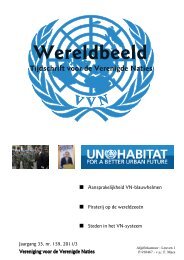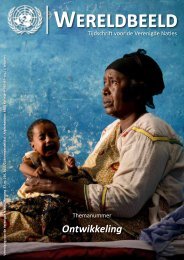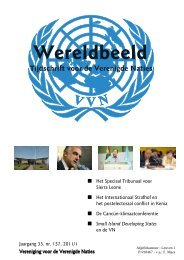Annex 5: United Nations Security Council Resolution 1874 (2009)
Annex 5: United Nations Security Council Resolution 1874 (2009)
Annex 5: United Nations Security Council Resolution 1874 (2009)
You also want an ePaper? Increase the reach of your titles
YUMPU automatically turns print PDFs into web optimized ePapers that Google loves.
India: more stakes in this crisis than would appear initially<br />
It has been argued that these developments in Northeast Asia have little relevance to India<br />
and South Asia. But according to the Indian analyst Chari, this comforting thesis is seriously<br />
flawed. North Korea’s aberrant behaviour threatens to unravel the international nonproliferation<br />
regime. The linkage, for example, between Pyongyang and Islamabad—both<br />
blatant proliferators—could strengthen in future. These general possibilities would have<br />
profound implications for India’s national security. Three particular developments, which,<br />
admittedly, lay out worst case scenarios are of special significance. First, North Korea’s<br />
intransigence will boost Iran’s nuclear ambitions, and encourage its exercise of the nuclear<br />
option, sooner rather than later. An unbroken chain of nuclear weapon states would then be<br />
established extending from Pyongyang to Beijing to Islamabad, New Delhi and Teheran.<br />
This proliferation chain would, almost inevitably, extend further into the Gulf and Middle<br />
East region. Second, a quantum increase in the number of nuclear armed countries in India’s<br />
neighbourhood raises the spectre of nuclear weapons being used in anger, but also the<br />
possibility of nuclear accidents rising exponentially, and the likelihood of these weapons<br />
falling into the hands of non-state actors. Third, the long-standing and close nuclear and<br />
missile transfer relationship between North Korea & Pakistan is well documented. Currently,<br />
both North Korea and Pakistan are currently being subjected to minute scrutiny, but their<br />
past ingenuity suggests that their clandestine relationship could get revived. According to<br />
Chari, this must attract India’s serious concerns. India should pose some counterfactual<br />
questions to the <strong>United</strong> States, China and Russia: “How could the financial instrumentality be<br />
fashioned to halt North Korea’s nuclear program? If this is considered impractical, why is this policy<br />
being pursued with Pakistan? If North Korea and Pakistan continue with their nuclear programs, how<br />
is it proposed to persuade Tehran to forsake its own nuclear quest” (Chari, <strong>2009</strong>: 8-9).<br />
Russian Federation: Many Goals, Little Activity<br />
The relations between the DPRK and the<br />
Russian Federation are less close<br />
compared to the relation China-North<br />
Korea, but there is a clear mutual<br />
understanding about the importance of<br />
containing US influence in the region<br />
and the world. The interests of Russia,<br />
China in the North Korean issue are<br />
relatively recent, having been triggered<br />
by the nuclear crises with North Korea<br />
of 1993 and 2002. Along with China,<br />
Russia is the only country in the Six-<br />
Party Talks (SPT) that maintains<br />
diplomatic relations with all of the other<br />
participants. Russia contributed to<br />
resolving the dispute between the US Treasury and North Korea on the Banco Delta Asia in<br />
2006-2007 (De Ceuster and Melissen, 2008). The Russian Federation is often considered to be<br />
the weakest party within the Six-Party Talks. Initially, Russia was not even supposed to have<br />
a role at all in the Five-Party Talks that the <strong>United</strong> States had planned to start in 2003; it was<br />
only by North Korean pressure that Russia was invited to join the talks as the sixth party.<br />
This does not mean, however, that Russia did not have any role of importance during the<br />
negotiations, but Russia’s role has been important for only two of the six countries involved:<br />
North Korea; and Russia itself. After Vladimir Putin became the Russian President in 2000<br />
that friendly relations between Russia and North Korea were re-established to some extent,<br />
© <strong>2009</strong> – Dr. D. Criekemans – Negotiations in UNSC on the continuing security provocations by North Korea 24







